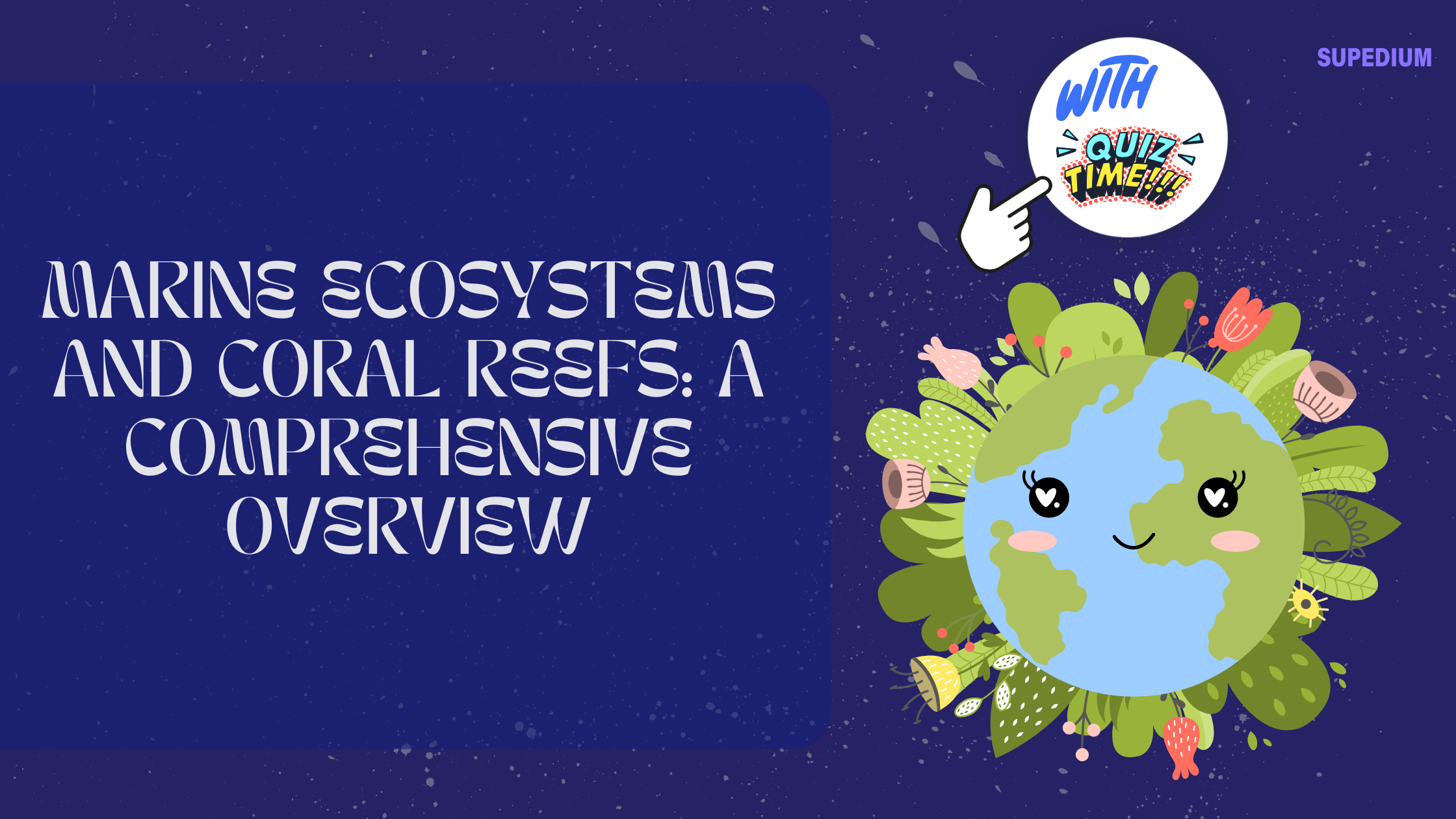Table of Contents
![]()
Introduction
Marine ecosystems encompass a diverse range of environments within the world’s oceans and seas. These ecosystems are crucial to the planet’s health, supporting a wide variety of life forms and providing essential services to humanity. Among these ecosystems, coral reefs stand out for their incredible biodiversity and the vital roles they play. This article explores marine ecosystems, with a particular focus on coral reefs, their significance, threats they face, and the ongoing efforts to preserve them.
Marine Ecosystems
Types of Marine Ecosystems
Marine ecosystems are classified into several types, each with unique characteristics and ecological functions.
- Coastal Ecosystems:
- Mangroves: These are coastal forests found in tropical and subtropical regions, characterized by salt-tolerant trees and shrubs. Mangroves play a critical role in protecting coastlines from erosion, providing habitat for wildlife, and supporting fisheries.
- Salt Marshes: Found in temperate regions, salt marshes are dominated by grasses and herbaceous plants. They act as buffers against storm surges, filter pollutants, and serve as breeding grounds for various species.
- Seagrass Beds: These underwater meadows of flowering plants occur in shallow marine waters. Seagrass beds stabilize sediments, support marine life, and contribute to nutrient cycling.
- Pelagic Ecosystems:
- Open Ocean: This vast, deep-water environment is home to species like tuna, sharks, and large marine mammals. It is characterized by low productivity but high biodiversity.
- Deep-Sea: Located at depths beyond the reach of sunlight, deep-sea ecosystems are adapted to extreme conditions, including high pressure and low temperatures. Unique species such as giant squids and bioluminescent organisms thrive here.
- Benthic Ecosystems:
- Coral Reefs: These vibrant structures are formed from coral polyps and provide habitat for an array of marine life.
- Rocky Reefs: Composed of hard substrates, rocky reefs support diverse marine communities including algae, invertebrates, and fish.
- Sandy and Muddy Bottoms: These softer substrates are home to species like clams, worms, and various crustaceans.
Characteristics of Marine Ecosystems
Marine ecosystems exhibit distinct characteristics:
- Salinity: The concentration of salt in seawater, which affects the types of organisms that can thrive.
- Temperature: Variability in ocean temperature influences species distribution and ecosystem health.
- Light Penetration: Sunlight penetration affects photosynthesis and the types of organisms found at different depths.
- Nutrient Availability: Nutrient levels, including nitrogen and phosphorus, influence primary productivity and overall ecosystem health.
Major Marine Species and Communities
Marine ecosystems are teeming with diverse life forms:
- Phytoplankton and Zooplankton: These tiny organisms form the base of the marine food web, with phytoplankton performing photosynthesis and zooplankton serving as prey for larger animals.
- Fish Species: From small reef fish to large pelagic species, fish play vital roles in marine ecosystems.
- Marine Mammals: Species like whales, dolphins, and seals are key components of marine ecosystems, often at the top of the food chain.
- Invertebrates: Jellyfish, mollusks, and crustaceans contribute to the complexity of marine communities.
Coral Reefs
Structure and Formation
Coral reefs are complex structures built by coral polyps, tiny marine animals that secrete calcium carbonate to form a hard skeleton. Over time, these skeletons accumulate to create reef structures. Reefs can be categorized into:
- Fringing Reefs: Directly adjacent to the shore.
- Barrier Reefs: Separated from the shore by a lagoon.
- Atolls: Circular or oval reefs encircling a lagoon.
Coral Reef Biodiversity
Coral reefs are renowned for their biodiversity:
- Coral Species: There are thousands of coral species, each contributing to the reef structure.
- Symbiotic Relationships: Corals host zooxanthellae, microscopic algae that perform photosynthesis and provide energy to the corals.
- Associated Marine Life: Reefs support myriad species, including fish, crustaceans, mollusks, and sea turtles.
Functions and Services
Coral reefs provide numerous ecological and economic services:
- Habitat and Nursery Grounds: They offer shelter and breeding grounds for a wide range of marine species.
- Coastal Protection: Reefs act as natural barriers, reducing wave energy and protecting coastlines from erosion.
- Economic Value: They support fisheries and attract tourism, contributing significantly to local economies.
- Carbon Sequestration: Coral reefs play a role in capturing and storing carbon dioxide, helping to mitigate climate change.
Threats to Marine Ecosystems and Coral Reefs
Natural Threats
Natural threats to marine ecosystems include:
- Hurricanes and Storms: These can cause physical damage to coral reefs and alter marine habitats.
- Disease: Marine species, including corals, can suffer from diseases that impact ecosystem health.
Human-Induced Threats
Human activities have significantly impacted marine ecosystems:
- Climate Change: Rising ocean temperatures and acidification threaten coral reefs through coral bleaching and weakened skeletal structures.
- Pollution: Plastic waste and chemical runoff from agriculture can harm marine life and degrade ecosystems.
- Overfishing: Excessive fishing can deplete fish populations and disrupt ecological balance.
- Coastal Development: Development projects can lead to habitat loss and increased pollution.
Impact Assessment
The effects of these threats are profound:
- Coral Bleaching: Higher temperatures can expel zooxanthellae from corals, leading to bleaching and potential coral death.
- Habitat Loss: Destruction of coral reefs and other marine habitats reduces biodiversity and ecosystem functionality.
- Decline in Marine Species: Overfishing and pollution can lead to a decrease in marine species and disrupt food webs.
Conservation and Management
Coral Reef Conservation Strategies
Efforts to protect coral reefs include:
- Marine Protected Areas (MPAs): Designated zones where human activities are regulated to preserve marine biodiversity.
- Coral Restoration Projects: Techniques such as coral farming and transplantation aim to rehabilitate damaged reefs.
- Sustainable Tourism Practices: Managing tourism to minimize environmental impact and promote conservation.
Global Initiatives and Agreements
Several international agreements address marine conservation:
- International Marine Conservation Agreements: These include treaties and conventions focused on protecting marine environments.
- United Nations Sustainable Development Goals (SDGs): Goal 14 aims to conserve and sustainably use the oceans, seas, and marine resources.
Community and Local Involvement
Local communities play a crucial role in conservation:
- Local Reef Monitoring Programs: Engaging communities in monitoring and managing coral reefs helps gather data and promote stewardship.
- Education and Awareness Campaigns: Raising awareness about the importance of marine ecosystems encourages sustainable practices and support for conservation efforts.
Case Studies
Great Barrier Reef, Australia
The Great Barrier Reef is the world’s largest coral reef system, facing challenges such as coral bleaching and climate change. Conservation efforts include large-scale reef restoration and research initiatives.
Caribbean Coral Reefs
Caribbean reefs are affected by climate change, overfishing, and pollution. Restoration efforts focus on rebuilding coral populations and protecting critical habitats.
Coral Reefs in the Indo-Pacific Region
The Indo-Pacific is home to some of the most biodiverse coral reefs. Conservation strategies in this region include community-based management and international cooperation to address cross-border issues.
Future Directions
Research and Innovation
Advances in technology and research are crucial for marine conservation:
- Coral Restoration Techniques: Innovations in coral farming and genetic research hold promise for improving restoration outcomes.
- Monitoring Technologies: New tools for monitoring coral health and marine ecosystems enhance data collection and management.
Policy and Global Cooperation
Strengthening international collaboration and developing effective policies are essential for marine conservation:
- Enhancing International Collaboration: Global partnerships and agreements can address transboundary marine issues.
- Policy Recommendations: Implementing policies that support sustainable management and conservation practices is vital for protecting marine ecosystems.
Conclusion
Marine ecosystems and coral reefs are integral to the health of our planet. Their diverse functions and services underscore the need for continued conservation efforts. By addressing threats through research, policy, and community involvement, we can work towards preserving these invaluable ecosystems for future generations. The ongoing commitment to protecting marine environments reflects a shared responsibility to maintain the balance of life on Earth.






Be the first to comment